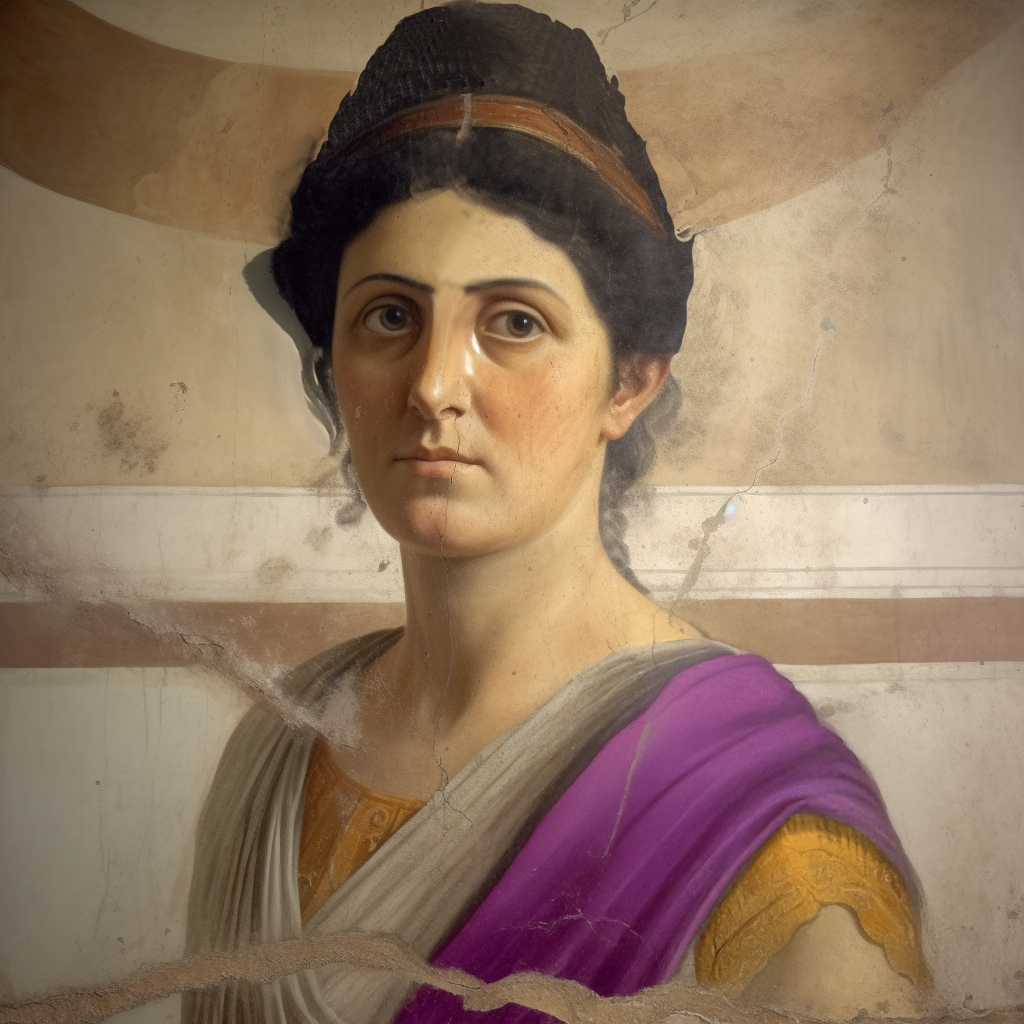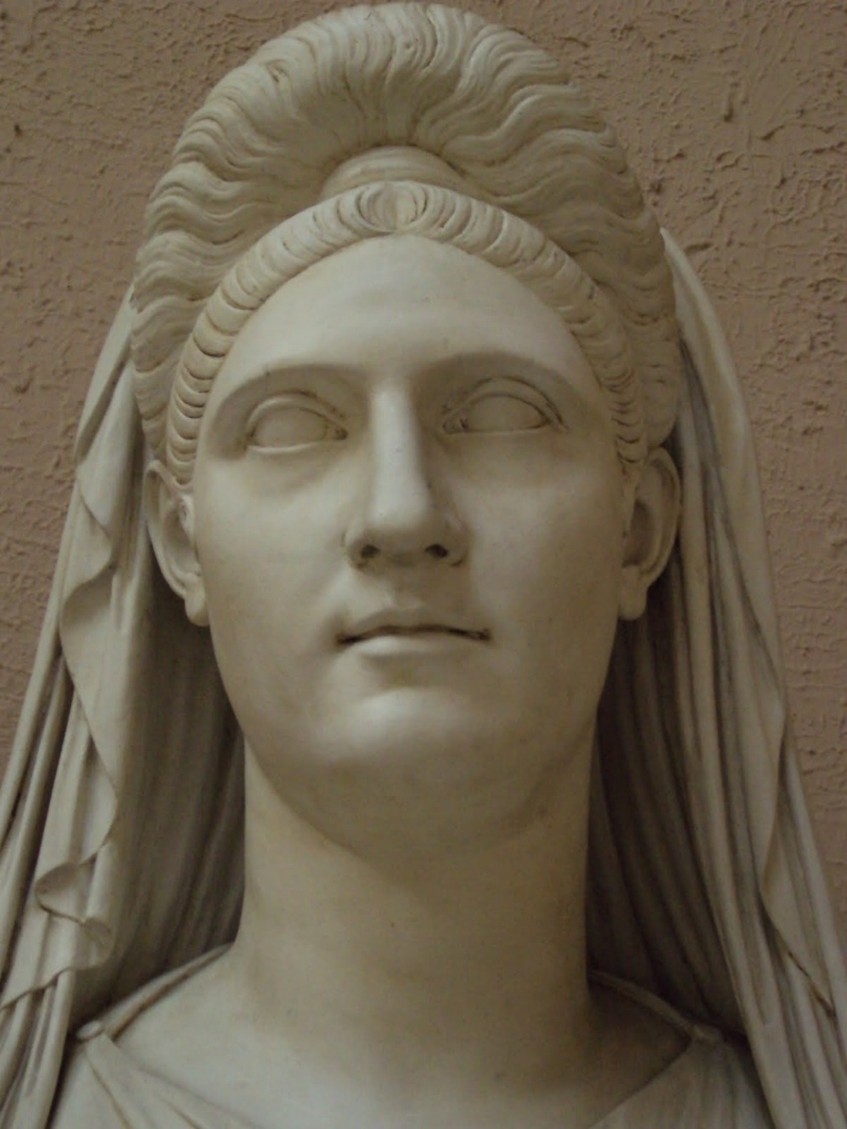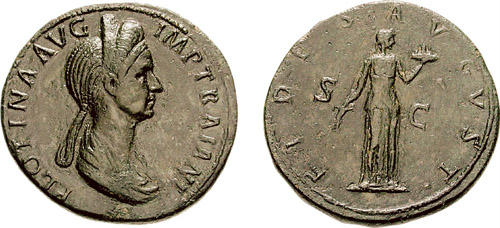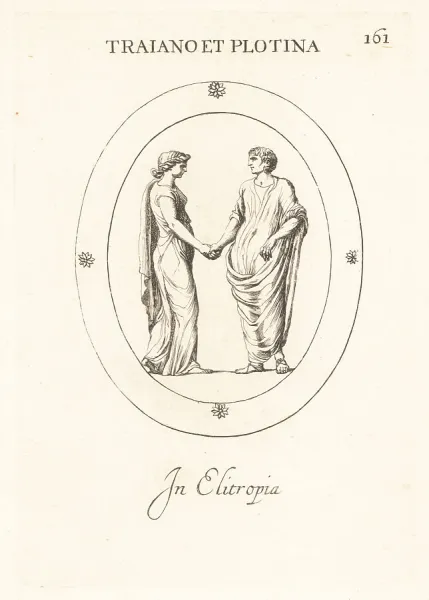Pompeia Plotina
Empress of Rome

Empress Pompeia Plotina was one of the most remarkable yet often overlooked empresses of ancient Rome. As the wife of Emperor Trajan, she played a crucial role in the administration of the empire, influenced important policies, and left a certain legacy of virtue and wisdom.
In many ways, she enriched the reign of her husband considerably through her virtue and intelligence. She was known for her natural wisdom, modesty, and dedication to philosophy, setting her apart from many other rulers of history.
EARLY LIFE
The details of Pompeia Plotina’s early life are scarce. She was born in Nemausus, the Roman city that is now Nîmes in modern-day France. Coming from a prominent provincial family, she likely received an excellent education, as evidenced by her later interest in philosophy and literature.
Little is known about her early family background, but it is possible that she was of senatorial or equestrian rank, a necessity for anyone marrying into the imperial family. On the other hand, some sources indicate she was a foreigner of Iberian extraction. At some point before Trajan's accession to the throne, Plotina married him. The couple had no children, which may have been due to personal choice or other factors.
BECOMING EMPRESS
Following the death of Emperor Nerva, Trajan became the ruler of Rome, and Plotina became his empress. From the outset of her tenure, she distinguished herself as a woman of great virtue. Trajan had created a power base from his endless military successes and was not necessarily the most experienced in political matters. Unlike many previous empresses who indulged in courtly intrigue or sought personal power, Plotina maintained a reputation for humility and highly ethical conduct informed by her readings of philosophy.

Her statuary and coinage are one of the most prolific of all mortal women in Rome
According to sources, upon entering the imperial palace for the first time as the wife of the emperor, she turned to the people and proclaimed that she would behave in a manner befitting her new position, neither changing her character nor becoming more arrogant. This insinuation reflected her lifelong commitment to moral principles and Stoic philosophy.
POLITICAL INFLUENCE
Despite her modesty, Plotina was not a passive figure in Trajan’s administration. She is believed to have played a significant role in several important reforms, particularly those related to taxation, education, and the fair treatment of provincial peoples. The emperor deeply respected his wife and considered her the Juno to the Jupiterian imagery he deployed. Dio of Prusa is emphatic when he says of Trajan:
γυναῖκα δὲ οὐ κοίτης μόνον ἢ ἀφροδισίων κοινωνὸν νενόμικεν, βουλῆς δὲ καὶ
ἔργων καὶ τοῦ ξύμπαντος βίου συνεργόν.He has not considered his wife to be merely a partner in bed or in physical pleasures, but rather a companion in counsel, in deeds, and in the whole of life.1
One of her greatest contributions was her advocacy for the rights of ordinary citizens. She encouraged Trajan to implement policies that benefited the common people, including fairer tax systems and improved social programs. She also supported efforts to curb corruption within the imperial administration, ensuring that officials were held accountable for abuses of power. The relentless commitment and compassion of Plotina made her honored among the Gods.
She was also a great philanthropist who gave much of her money to the poor for their relief. As a result, she was much beloved by the lower classes of Rome and her patronage of Hadrian enabling him to benefit from this image contributed strongly to the type of stability the ‘Good Emperors’ enjoyed from Nerva to Marcus Aurelius.
PHILOSOPHICAL EMPRESS
A devoted student of philosophy, Plotina was a strong supporter of Stoicism and Epicureanism. She corresponded with prominent philosophers of the era and encouraged intellectual discourse in the Roman court.
Her patronage extended beyond philosophy to architecture and literature. She was responsible for the construction of various public buildings, including libraries and temples dedicated to intellectual pursuits. One of her most significant contributions was the construction of the Trajanic Baths and a library in Rome, which housed important philosophical works.

Plotina, in fact, was a well-educated woman who acted as a patron of learning. W. McDermott argues that ‘the noblest and most revered woman’ that the eastern mathematician and neo-Pythagorean philosopher Nicomachus addresses in his Enchiridion Harmonicon is in fact Plotina. More secure evidence of her intellectual interests is attested in the epistolary exchange between Plotina and the emperor Hadrian, which has been preserved in a fragmentary bilingual inscription from Athens dated to 121. This correspondence was concerned with the appointment of the head of the Epicurean school. Law stated that only Roman citizens could fill this post, but it seems that there were no suitable candidates among Roman citizens at that time. Plotina interceded with Hadrian on behalf of Popillius Theotimus, the then-current head of the school, by writing the emperor a letter, in Latin, in which she asked him to loosen this rule and allow peregrines to achieve leadership positions in the school. In his reply to Plotina, in Latin, Hadrian granted the request.2
THE HEBREW ISSUE
Empress Plotina has gone down in history as a ‘philosemitic’ empress, mostly from Jewish sources but even from strange rants like the Oxyrhynchus Papyrus 1242. Some of these sources even go as far as to suggest she had Jewish ancestry.
In reality, this is a complete falsehood. Her persona was co-opted by the Hebrews and insulted in certain texts through being represented as the wife of a generic emperor, sometimes represented as the ‘matronita’ in the Avodah Zarah.
She was a blatant and unrelenting enemy of the Hebrews. When she attended a peace conference chaired by Trajan and herself out of philosophical principles, the Jews insulted her. In the aftermath of the Kitos War, Hebrews in Cyprus who had led the mass-murder of 240,000 inhabitants were decimated and destroyed. Trajan was known to have banned Jews from the island altogether. Agitators who had killed endless people in Cyrene were also destroyed completely.
As Plotina was known to even influence matters like this, the facts speak for themselves on this matter. She was also aware of Hadrian’s intentions and continued to support him.
SUCCESSION OF EMPEROR HADRIAN
One of the most controversial and impactful decisions associated with Plotina was her role in securing the succession of Hadrian, Trajan’s distant relative. While Trajan had never officially named an heir, Plotina reportedly ensured that Hadrian, whom she greatly favored, would succeed her husband.

Some ancient sources suggest that she played a decisive role in persuading the ailing Trajan to adopt Hadrian as his son and successor, a matter she directly refers to when she names Trajan as a ‘good son’ to the School of Epicurus. Others go further, alleging that Plotina and her allies may have moved to secure the throne.
Hadrian, once emperor, remained deeply grateful to Plotina and honored her contributions to the empire.
Following Trajan’s death, Plotina withdrew from public life. Unlike other influential empresses, she did not seek power for herself but rather continued her philosophical pursuits and patronage of the arts. She maintained a close relationship with Hadrian, who respected and deified her.
Pompeia Plotina passed away. In recognition of her contributions and legacy, Hadrian deified her, granting her divine honors and ensuring that her name would be remembered in Roman history.
LEGACY
Plotina’s legacy is one of wisdom, integrity, and dedication to the betterment of Roman society. Unlike many empresses who wielded power through scandal, she stands as an example of ethical leadership and intellectual curiosity.
Her promotion of philosophy and education helped shape the intellectual culture of Rome, and her influence on Trajan’s administration left a lasting impact on imperial governance. The role in securing Hadrian’s rule ensured the continuation of stable leadership, guiding Rome through one of its most prosperous periods.
Though she is not as well-known as other Roman empresses, Pompeia Plotina’s legacy as the philosopher empress endures. Her commitment to justice, learning, and virtue makes her a rare and admirable figure in the annals of rulers.
BIBLIOGRAPHY
1De Regno, Dio of Prusa
2Plotina and the (Re)Invention of the Tradition of Womanhood, Margherita Carucci
Roman History, Cassius Dio
Trajan: Optimus Princeps, Julian Bennett
De Caesaribus, Aurelius Victor
CREDIT:
[TG] Karnonnos

 አማርኛ
አማርኛ العربية
العربية বাংলা
বাংলা Български
Български 中文
中文 Čeština
Čeština Dansk
Dansk Deutsch
Deutsch Eesti
Eesti Ελληνικά
Ελληνικά Español
Español Français
Français हिन्दी
हिन्दी Hrvatski
Hrvatski IsiZulu
IsiZulu Italiano
Italiano 日本語
日本語 Kiswahili
Kiswahili Magyar
Magyar Македонски
Македонски नेपाली
नेपाली Nederlands
Nederlands فارسی
فارسی Polski
Polski Português
Português Română
Română Русский
Русский Slovenščina
Slovenščina Suomi
Suomi Svenska
Svenska Tagalog
Tagalog Türkçe
Türkçe